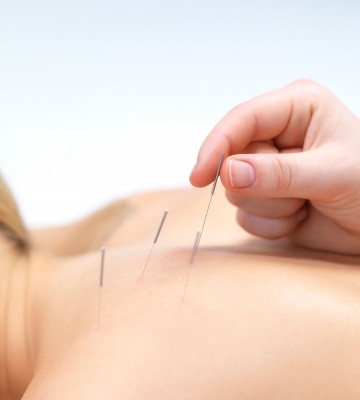Pregnant women who are at the end are often looking for anything that will help speed along the process and kick-start labor. Tips from eating spicy food, castor oil, and acupuncture are often passed around as ways to get labor going. According to a new study though, acupuncture really does not help.
Dr. Niels Uldbjerg, a professor of obstetrics and gynecology at Aarhus University Hospital in Denmark, lead the study involving 125 pregnant women who were near their due dates. The women were randomly selected to receive acupuncture treatments, a ‘sham’ version of acupuncture, or none at all. The researchers then waited to see who would actually go into labor.
Only 12 percent of the women that had two acupuncture sessions went into labor within the next 24 hours. The women who had fake acupuncture had a 14 percent labor rate within the next 24 hours. The numbers are less than exciting.
Between 5 and 10 percent of women have pregnancies that go beyond an estimated 41 weeks. Because longer pregnancies may raise some risks in some women, most doctors will schedule an induction or cesarean section for women who show no signs of labor. Many pregnant women, however, begin looking for safe induction methods to end the annoyances of pregnancy in the last few days. Pain, exhaustion, uncomfortableness, and other issues can make a woman begin looking for tried and true induction methods.
Acupuncture is believed to work by stimulating the nervous system of the pregnant woman. This in turn would cause the uterus to begin contracting. From this study, however, it seems that acupuncture does not work as well as believed. – Summer, staff writer
Related Articles:
- Acupuncture May Help Pregnancy Depression
- Study: Inducing Labor May Lead To Higher Risk of C-Section
- Pregnancy Experts Warn Against Inducing Labour








When looking at the results of acupuncture studies it is important to investigate the actual treatment method used. The efficacy of acupuncture is challenging to test in the western medical research framework. The reason for this is that in order to do a legitimate study the patients all have to receive the same treatment.
However, this is not how a skilled and trained acupuncturist practices. To give every patient with the same condition the same treatment goes against the very basic theory of Chinese medicine. First of all, treatment is based on Chinese medical diagnosis. This diagnosis takes into account the individual’s unique presenting pattern. So for example patient #1 who is overdue may be overdue for different reasons than patient #2 and therefore would get a different treatment.
So not knowing the treatment methods used in this study I don’t think it is conclusive either way: whether acupuncture does or does not work for inducing labor. I don’t think it should be ruled out as a viable option as it may help some people and certainly does not pose any risk. Anecdotally, I have seen good results in clinic with acupuncture inducing labor.
I agree with Tolley Sink’s comment. Each patient is different and must be treated according the her presenting signs and symptoms. Many acupuncturist have had great success in helping women induce labor with acupuncture. At the very least, acupuncture will induce relaxation, which in turn will help induce labor. Having trained as a massage doula, I have seen first hand how important it is for the mother to be to be in a very relaxed space during this time. And many times, women who have received acupuncture throughout their pregnancy have a very relaxed and peaceful labor experience. Since acupuncture does not pose a risk to the mother or baby, it should not be ruled out just because one study did not have dramatic results. Having evolved over the last 5,000 years, acupuncture has stood the test of time and proven itself over and over again.